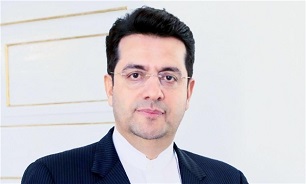Iran Rejects Media Claims about Demand for Talks with US
 "No demand has been raised for negotiations with the US, and no negotiations are underway with Saudi Arabia other than issues and subjects related to Hajj which have been agreed to be separated from political issues and relations between the two countries," Foreign Ministry Spokesman Seyed Abbas Mousavi said on Saturday.
"No demand has been raised for negotiations with the US, and no negotiations are underway with Saudi Arabia other than issues and subjects related to Hajj which have been agreed to be separated from political issues and relations between the two countries," Foreign Ministry Spokesman Seyed Abbas Mousavi said on Saturday.
He underlined Iran's fully clear policy of mutual respect and good neighborliness with neighbors, noting that Saudi Arabia is an important regional state which has opted for an incorrect path with an unconstructive approach in recent years that has created many tragedies and crises in the region.
Mousavi expressed the hope that the Saudi officials would soon return to the path of honest good-will towards the regional nations, stressing that Iran will be ready to interact with Riyadh within the framework of bilateral and regional cooperation in those conditions.
In relevant remarks on Thursday, Mousavi had described US Special Representative for Iran Brian Hook's proposal for talks with Tehran as a "joke", saying that Washington had closed all doors to negotiations through arrogant behavior and threats.
"The path to any kind of negotiations has been closed given the Americans' dishonesty, bullying and their record as well as their stated approach to this issue," Mousavi said in an interview with the state TV on Thursday.
He mocked at Hook's proposal for talks as a joke, saying Iran believed the US demand for talks was no way serious "and they, themselves, are also aware that their demand is not serious".
"If the Americans were men of negotiations and agreement, the (2015) nuclear deal was the best negotiations and agreement which could lead all countries to a united destination," Mousavi said.
Hook's remarks came after the White House said on Monday waivers for China, India, Japan, South Korea and Turkey would expire in May, after which they could face US sanctions themselves if they buy the Iranian oil.
Iranian President Hassan Rouhani on Wednesday downplayed the effects of Washington's decision to end sanctions waivers on Iran's oil sales, and dismissed talks with the US administration which uses the language of threat and force to demand negotiations.
"We have always been people who favor talks and diplomacy as we are people of war and defense. Negotiations will be possible when all pressures are taken off, they (the US) apologize for their illegal measures and when there is mutual respect. Undoubtedly, demands by a knife-stabbing person who lies and is using force to hold talks is not accepted and we do not negotiate with a knife-stabbing person and with the formula of knife-stabbing, as accepting such negotiations means humiliation and surrender," President Rouhani said, addressing a cabinet meeting in Tehran on Wednesday.
He said that the US was no way ready for negotiations, reminding that Washington's 4-decade-long plots against the Iranian nation had all ended in fiasco and failure for the White House.
"And they will fail in their plots again," Rouhani underscored.
He played down the US threats to zero Iran's oil exports, saying, "This is not possible and we will sell our oil in different ways, while this move by the US is an oppression against all the world nations, international oil firms and even its own nation."
President Rouhani said Iran was pleased with all its neighbors, except Saudi Arabia and the UAE, and sent them a tacit warning. "They should note their acts and behavior. Saudi Arabia and the UAE should know that they have survived because of the wise decision made by the Islamic Republic of Iran's government."
He explained that when Iraqi dictator Saddam Hussein occupied Kuwait in 1990s he sent a message to demand Iran's cooperation with Baghdad in occupation of other Persian Gulf Arab states, but his offer was turned down by Iran.
"It was the Islamic Republic of Iran which saved Saudi Arabia; had we made another decision in that period of time, there would have been no sign of Saudi Arabia and the UAE," Rouhani said.
He blasted Riyadh and Doha for their collaboration with the US in pressuring Iran through compensating for Iran's production share to be lost under the new US decision.
"You know that the Islamic Republic of Iran is the main regional power and if it changes its decision, it will bring it into action; therefore, you must choose a path beneficial to the regional and world nations and the market," President Rouhani said.
Message end/
